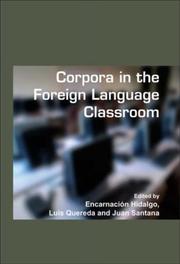| Listing 1 - 2 of 2 |
Sort by
|

ISBN: 9789042021426 904202142X 9401203903 1429481390 9781429481397 9789401203906 Year: 2007 Volume: 61 Publisher: Amsterdam ; New York, NY : Rodopi,
Abstract | Keywords | Export | Availability | Bookmark
 Loading...
Loading...Choose an application
- Reference Manager
- EndNote
- RefWorks (Direct export to RefWorks)
The papers published in this volume were originally presented at the Sixth International Conference on Teaching and Language Corpora (4-7 July 2004 Granada, Spain) and reflect the latest developments that have taken place in the field of the teaching applications of text corpora, with a special emphasis on their use in the foreign language classroom. The book is divided into three main sections. The first section sets the scene for what this collection of essays aims to be. It deals with the issue of what corpus linguistics can do not only for the understanding of the nature of language itself but also for so fundamental and miraculous a matter such as language learning and language acquisition. The second section tackles the issues of corpus design and corpus exploitation and provides the reader with a great variety of evidence in favour of corpora exploitation for the building of a successful teaching environment. The final section deals with practical applications of corpora in the foreign language classroom. Although each of the papers here reports particular experiences in very different teaching and learning contexts, as a whole they show that corpora can be used on the spot in a language teaching context by teachers and learners without extensive training in computational tools, and studies of linguistics features can be tailored to specific pedagogic context and learning requirements. The book represents a solid contribution to linguistic studies and language teaching and it is a good example of the diversity of the scientific lines in which corpus linguistics is involved at the present moment.
Language and languages --- Corpora (Linguistics) --- Translating and interpreting --- Computational linguistics --- Computer-assisted instruction --- Data processing --- Interpretation and translation --- Interpreting and translating --- Literature --- Translation and interpretation --- Translators --- Corpus-based analysis (Linguistics) --- Corpus linguistics --- Linguistic analysis (Linguistics) --- Translating --- Conferences - Meetings --- Computational linguistics -- Congresses. --- Corpora (Linguistics) -- Congresses. --- Language and languages -- Computer-assisted instruction -- Congresses. --- Translating and interpreting -- Data processing -- Congresses. --- Languages & Literatures --- Philology & Linguistics --- Data processing. --- Language and languages - Computer-assisted instruction - Congresses. --- Corpora (Linguistics) - Congresses. --- Translating and interpreting - Data processing - Congresses. --- Computational linguistics - Congresses.
Book
ISBN: 1953936563 Year: 2021 Publisher: Saint Paul, Minnesota : Saint Paul Seminary Press,
Abstract | Keywords | Export | Availability | Bookmark
 Loading...
Loading...Choose an application
- Reference Manager
- EndNote
- RefWorks (Direct export to RefWorks)
"Carlos Granados and Luis Sánchez-Navarro propose reading the Bible with Christian faith, not as one approach among many, but as a disposition demanded by the New Testament for proper interpretation of both the Old and the New. Even so, the authors' faith never leads them to dismiss history or to discard the tools of the historical-critical method. On the contrary, these sciences allow the faithful reader to take a holistic approach to biblical truth. When the reader also takes full account of the ecclesial reality in which the Bible was formed and transmitted, and in which it must be read still today, he or she encounters the word proclaimed by the text. Indeed, the words of Holy Writ ultimately proclaim THE Word (Logos), Jesus Christ, in whose Spirit they were written. This book's thirteen essays are grouped into three parts. Part I, "The Church, Living Subject of Sacred Scripture," takes up a foundational theme of the whole book: sacred Scripture calls for a reading within the community of the People of God under the guidance of the Holy Spirit, and the same People constitute the living subject of Scripture. In Part II, "Christ, Exegete of the Fulfillment," the authors focus on the relationship between the two biblical testaments. They argue that the Christian can both respect and venerate the Old Testament on its own terms, even as they find in Jesus, as presented in the New Testament and encountered in faith, the key for unlocking the Old Testament's deepest meaning. The third and final part of this book, "The Teaching in Benedict XVI's Verbum Domini," examines Pope Benedict XVI's 2010 post-synodal apostolic exhortation on the word of God in the life and mission of the Church. The authors' years of shared prayer, study, conversation, and ministry have led to this coauthored book bearing witness to that ongoing unity that they live as confreres. Not surprisingly, they frequently reference the same theologians, especially Brevard Childs, Paul Beauchamp, SJ, and Pope Benedict XVI"--
Bible --- Hermeneutics. --- Reading.
| Listing 1 - 2 of 2 |
Sort by
|

 Search
Search Feedback
Feedback About UniCat
About UniCat  Help
Help News
News